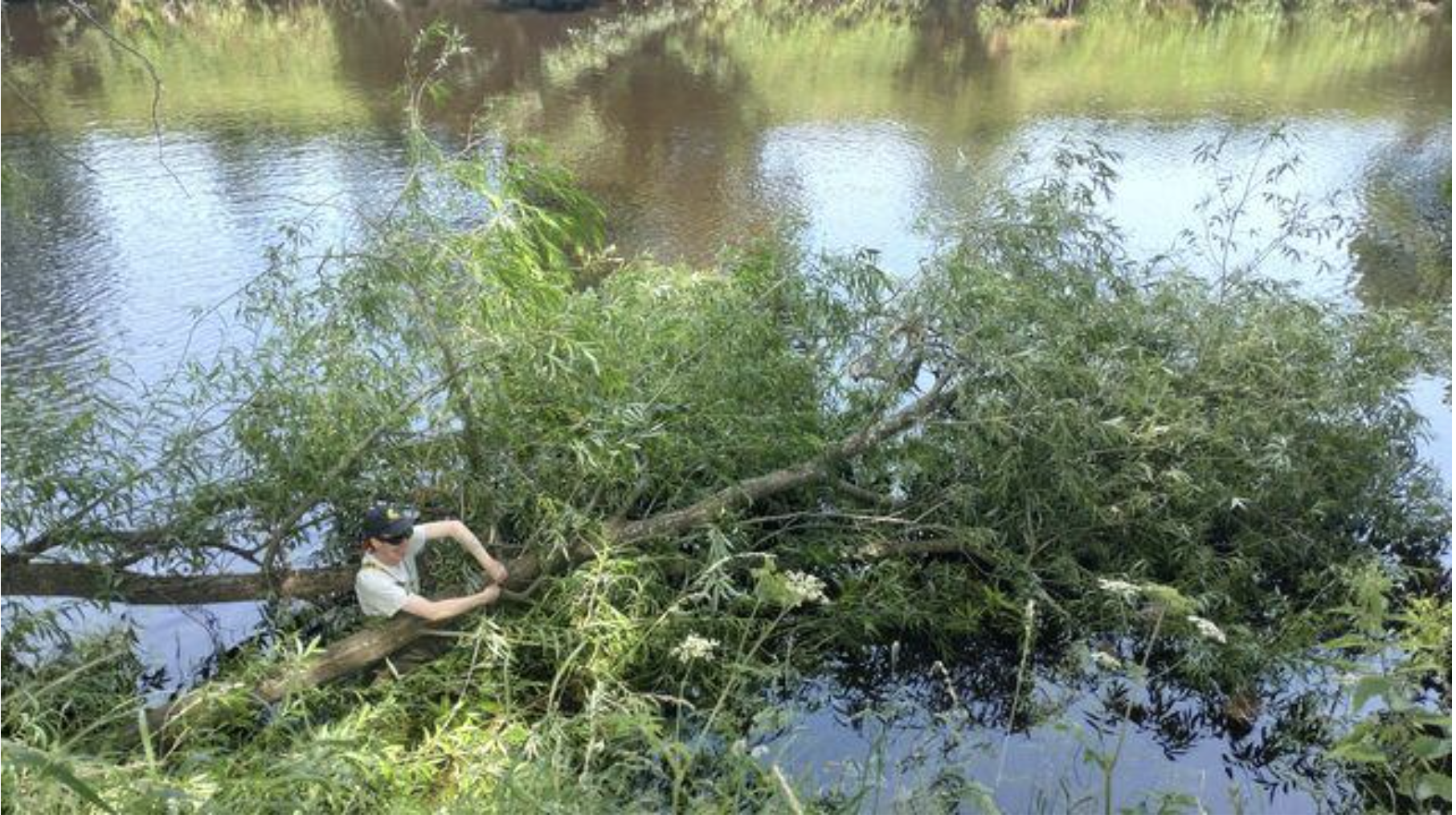For his PIPS, Freddy worked for the Wild Trout Trust: a conservation charity working across the UK and Ireland.
The featured image is of Freddy working for WTT.
What did you do?
During my PIPS I worked for the Wild Trout Trust which involved travelling to numerous sites across North Yorkshire and West Yorkshire to becks and rivers in: Aire, Swale, Nidd, Wharfe, Calder and Ribble catchments. The placement involved both fieldwork and office work. The fieldwork element was incredibly varied and was fantastic. Fieldwork comprised of two main elements habitat monitoring or habitat improvement works.
Habitat monitoring work involved electrofishing on becks, in this work an electric current was passed through the water to temporarily stun the fish. Fish were then collected with species diversity, population and population age makeup measured. This would give an insight into condition of watercourse and potential issues such as relating to fish spawning for example. Other issues such as over grazing and sediment ingress or presence of weirs that are blockers to fish passage were noted during electrofishing or walkovers of new stretches and reported on.
Habitat improvement works involved a variety of both in and out of stream approaches with an overarching goal of increasing biodiversity, fish population size and spawning habitat. Examples of such work were installation of flow defectors, removal or notching of weirs, selective felling and laying of trees into watercourses and removal of culverts.
Office work involved writing reports detailing habitat on becks, blog posts for interaction with wider community and attending meetings with a wide variety of partners to discuss issues, challenges and funding for future and past projects.
Check out Freddy’s blog posts here:
- https://www.wildtrout.org/wttblog/welcome-freddy-weaver
- https://www.wildtrout.org/wttblog/getting-stuck-in
- https://www.wildtrout.org/wttblog/reflections-on-a-summer-with-wtt
What made you want to do that particular placement?
I am a keen fisherman and have a passion for the outdoors particularly relating to the aquatic environments. The Wild Trout Trust’s approach of using native brown trout as a keystone species for evaluating overall habitat health results in large benefit across a wide variety of urban and rural habitats both in the water and out. So, the opportunity to give my help and time to this wonderful goal was a real appeal. Furthermore, it was the opportunity to try something completely different from my day-to-day lab work and learn so much about an environment I cherish and have enjoyed since childhood. Finally a summer outdoors in the wonderful Yorkshire countryside I felt would be a lovely break and recharge from my academic studies.
How did you go about finding and planning your PIPS?
I decided that working with environmental charities that specialise in the aquatic environment was my choice for PIPS. I then proceeded to email local and national charities that do this work with my CV, an explanation of who I was, what PIPS involved, and why I wanted to apply to them. Unfortunately, a number failed to respond or communication broke down on their end. However, on contacting the WTT I had a response and was put in touch with Yorkshire Research & Conservation officer Professor Jonathan Grey and after a phone call interview he decided to go ahead with me and the PIPs programme.
What have you gained from doing your PIPS?
It has given an insight into not only the challenges facing our waterways, but a more holistic understanding of the working environment that is our countryside. Furthermore, it has given me an introduction to the wider world of ecology and habitat improvement. In addition, it has improved my communication skills in both written and oral form. In particular communication of ideas to both a technical and non-technical audience such as outreach at country shows.
How would you sum up your PIPS experience?
A summer that I will treasure for a long time. That succinctly encapsulates my feelings toward the last three months working with the Trust. A brilliant time that taught me so much about the natural world and how we can work to rectify the damage that we have done to it. Just fantastic.
What advice would you give to other PGRs about PIPS?
It is my belief that PIPS is a fantastic opportunity to broaden horizons to what work is available beyond your own academic speciality. In particular if you have a passion, try to find a PIPS that in some way works in that field and follow your heart rather than doing the expected norm within your area.
Make it as enjoyable as you can and cherish this opportunity to try something new. A PhD is hard so why not use the 3-months to discover something new and have fun!

